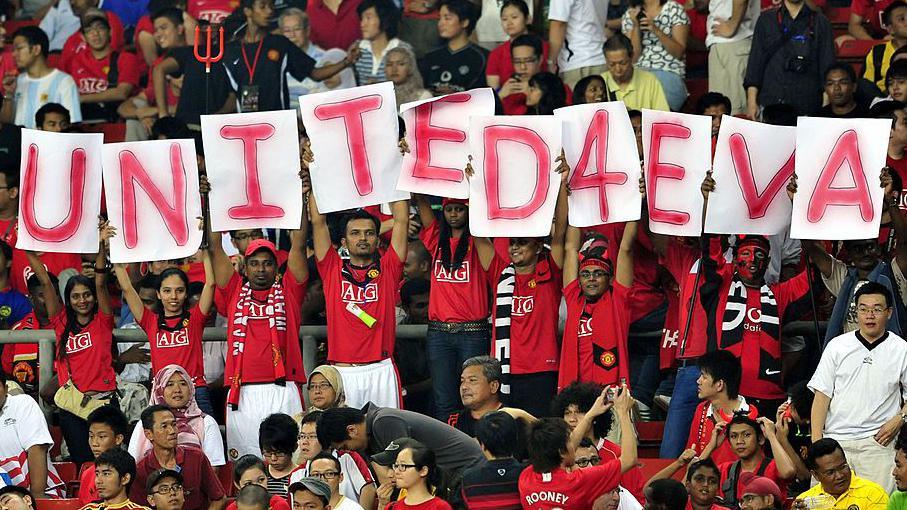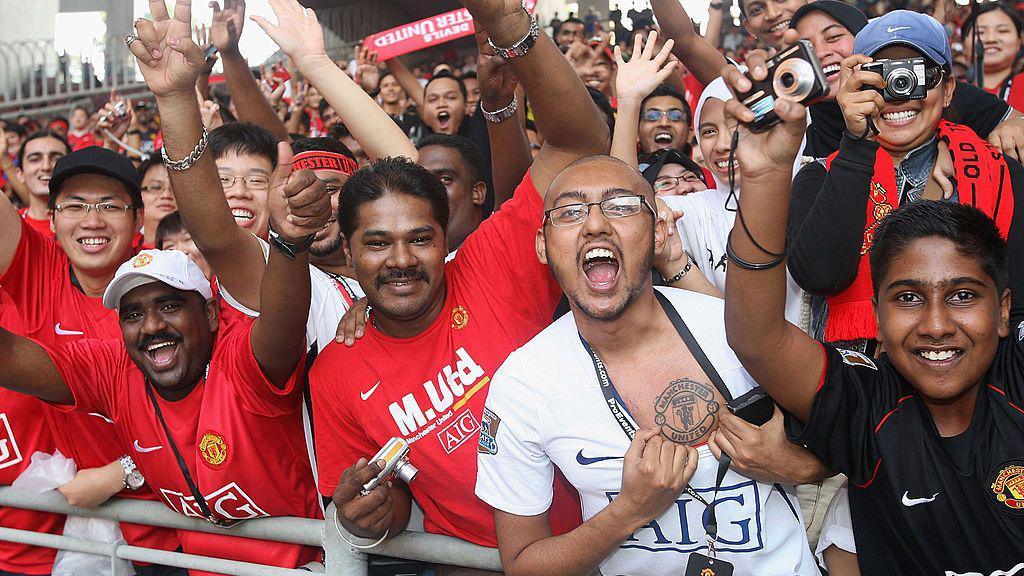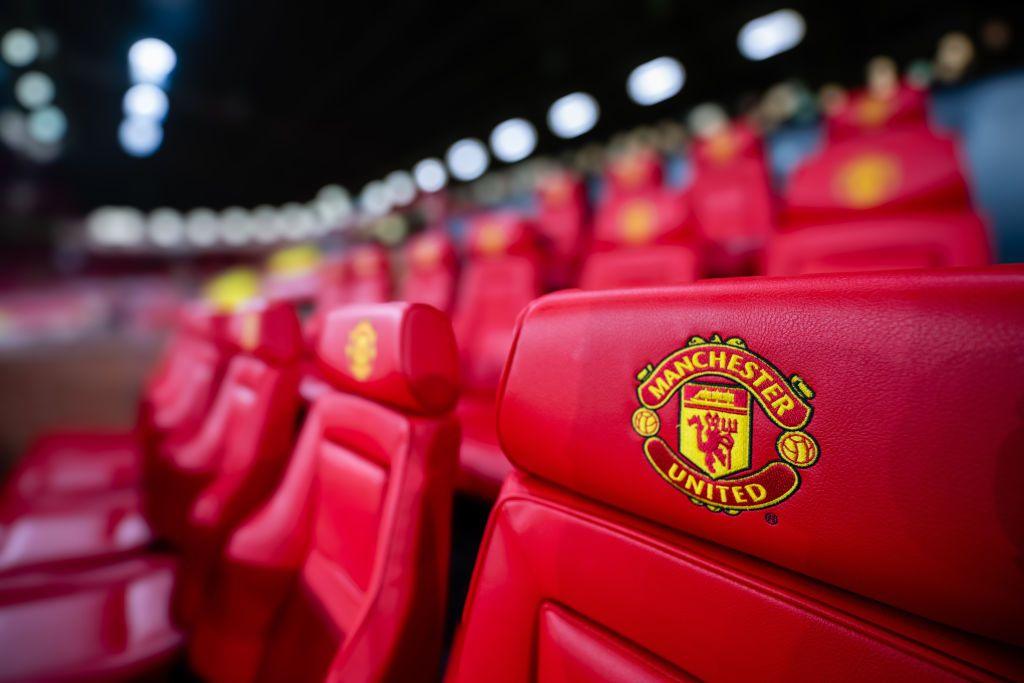'Why support a team that loses?' - how fans in Asia moved on from Man Utd

Manchester United have traditionally held a strong support in Malaysia
- Published
Manchester United kick off their Asian tour against the ASEAN All Stars on Wednesday in Kuala Lumpur, just a week after the Europa League final loss to Tottenham Hotspur and three days following the conclusion of a dismal season.
To jump into the warm embrace of fans far away may provide some relief from the headlines at home, but the 20-time English champions may find that their standing in Asia is not quite what it was.
The last time the Premier League trophy went to Old Trafford was in 2013. A year earlier, the club commissioned a report which claimed they had 659 million followers worldwide, around half of which were from the Asia-Pacific region.
While there was doubt about such numbers and also how a 'follower' is defined, the Red Devils were then clearly the most popular English team in Asia and perhaps the most popular team from anywhere.
Commercial performance in Asia remains strong, with reports suggesting the club will earn around £8m for these two games in three days.
Repeated failures on the pitch - such as finishing this Premier League season in 15th - have, however, had an effect on fans, according to Kuala Lumpur-based journalist Haresh Deol, founder of Malaysian news organisation TwentyTwo13.
"There is chatter among fans [about the game], some form of excitement, but it isn't as intense as the club's prior visits to the region, when it was performing well in the Premier League," Deol told BBC Sport.
Man Utd close to signing Wolves' Cunha
- Published26 May
Man Utd fly to Asia on post-season tour
- Published26 May
Man City want Milan midfielder Reijnders - Tuesday's gossip
- Published26 May
The 84,000 capacity Bukit Jalil Stadium is one of Asia's biggest and while, according to organisers, more than 40,000 tickets were snapped up within hours of going on sale, there are still seats available in most price categories.
That is in contrast to United's last visit to the same ground in 2009, when Sir Alex Ferguson's side thrilled a sold-out crowd with a 3-2 win over a Malaysia XI - Wayne Rooney, Nani and Michael Owen scored the goals.
There are reports in China that Friday's game in the 40,000-seat Hong Kong Stadium against a Hong Kong XI may also not sell out.
For the Malaysia match, it is likely that not as many fans will make the trip from neighbouring Thailand as in the past.
"Some of the loyal fan base who can afford to go will go, but I guess they are not excited and will go to cheer up and support the players, that's all," explained Narinpaj Bunyavirapan, a Bangkok-based Manchester United fan and influencer.
'Liverpool seemed more cool'
Fifteen years ago, United ruled the roost in South Korea, with national hero Park Ji-sung winning trophy after trophy.
"Back then, they were obviously the club which had the biggest fan base in South Korea," said author Lee Seung-mo. "The popularity they had was incomparable with any other European football teams at that time.
"Now they still have many passionate fans, but the situation has changed a lot. They keep underperforming by their standards."
At the same time, other English clubs have been making progress on and off the pitch.
"Especially after Pep Guardiola's arrival, Manchester City got a lot of supporters in South Korea and Liverpool got their glory back," said Lee.
Liverpool have held deep support in the traditional South-East Asian hotbeds like Malaysia and Singapore that have watched English football for over half a century but their recent resurgence has helped them in markets such as India, China and Japan which started tuning in to the Premier League much later.
"Under Jurgen Klopp, Liverpool were not just successful again but seemed more cool with the way they played, their stars as well as Anfield," said Mumbai-based United fan Rahul Singh.
"City have just been so successful with Pep and Erling Haaland is very famous. United are not only not winning trophies but they are not exciting to watch."
This has, according to Singh, led younger fans to look elsewhere.
"Why choose to support a team that loses a lot?" he said.
There are other options for those starting to get into the sport.
"Some fans, like those who are between 25 and 40 who began following United in the nineties and 2000s, are still there," said Bunyavirapan. "These days, though, the number of kids that support Man City are increasing.
"One of my friends tried to buy United jerseys for his sons but they chose City jerseys instead."
That is only going to continue in Malaysia also, according to Deol: "The younger generation want to associate themselves with teams that are actually consistently at the top."
'We believe United can be stronger than before'

United last visited Kuala Lumpur in 2009
Signing an Asian player can be a quick way to attract more fans in Asia.
Tottenham Hotspur are the most popular in South Korea simply because Son Heung-min has been a major star at the club since 2015.
"A large portion of Korean fans are more interested in Tottenham than United because of Son," said Lee.
Meanwhile, Brighton and Hove Albion have become one of the best known European teams in Japan since the arrival of Kaoru Mitoma.
Asian ownership can make a difference as well. Thailand's King Power have been in charge of Leicester City, a run that has included a Premier League win, FA Cup glory and relegation heartbreak.
"There are Thai football fans who support Leicester as their second club," Bunyavirapan said. "There's a campaign called 'Leicester's friend ball', which says 'you don't have to love us like a fan, but it is enough that you support us as a friend'."
Yet, despite their struggles, United remain big news.
"They are still a special club in Korea with a lot of hardcore fans, more than Liverpool, Chelsea or Arsenal," said Lee. "There are many criticising the results on a weekly basis but that's actually evidence that the interest is still there."
And there is still belief among fans in Asia.
"The downfall started when Ferguson left and now it is broken, like a collapsed building," said Bunyavirapan.
"But we believe it can be built stronger than before. We just have to wait."
Related topics
- Published26 July 2022

